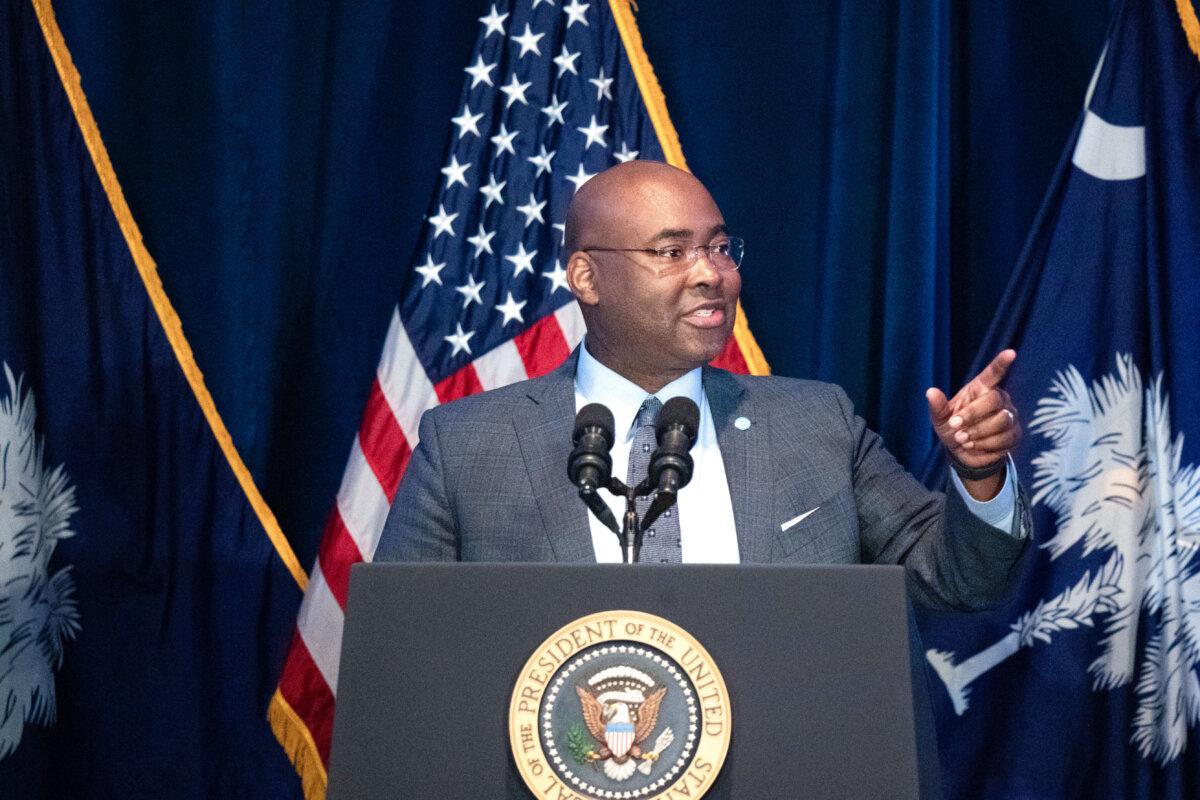President Joe Biden endorsed Vice President Kamala Harris as the party nominee, but the Democratic ticket is still uncertain.
President Joe Biden pulled out of the 2024 presidential race on July 21 and immediately endorsed Vice President Kamala Harris as the new party nominee.
Even with his endorsement of Ms. Harris, the future of the party ticket is uncertain, and Democrats must now navigate an unprecedented shift late in the election year. Ms. Harris has announced her intention to “earn and win this nomination.”
The Democratic National Convention is scheduled for Aug. 19–22 in Chicago, Illinois. Originally, the event would have been a coronation for President Biden as the Democratic nominee, but now the convention will see an open contest of nearly 4,700 delegates looking for a new challenger to pit against former President Donald Trump in November.
The issues facing the ticket range from funding concerns to political logistics, like delegate support.
Delegates
President Biden has at least 3,896 delegates pledged to support him after winning every state primary and caucus in 2024 besides the territory of American Samoa. DNC rules prevent the president from passing them to another candidate, but his endorsement of Ms. Harris could prove influential to whomever they opt to support.
Despite Ms. Harris’s plans to run for president, other candidates could make pitches during or ahead of the convention.
Amid speculation after the June 27 Biden–Trump debate, several names have been floated, with some polling higher than President Biden in key swing states.
Some of those names include California Gov. Gavin Newsom, Michigan Gov. Gretchen Whitmer, Sen. Mark Kelly (D-Ariz.), Pennsylvania Gov. Josh Shapiro, Maryland Gov. Wes Moore, Transportation Secretary Pete Buttigieg, Illinois Gov. J.B. Pritzker, former First Lady Michelle Obama, and Kentucky Gov. Andy Beshear.

Whoever decides to run will have to vie for support from President Biden’s committed delegates, potentially leading to public debates among candidates. Those delegates are the only ones allowed to vote for a candidate in the first round.
If no candidate receives enough votes for the nomination in the first round, party leaders and other Democratic elites, known as “superdelegates,” can vote in subsequent rounds. The party has more than 700 superdelegates.
The vice presidential nomination would come in a separate convention vote. Normally, the convention approves the presidential nominee’s choice of vice president. If Ms. Harris receives the support of all pledged delegates quickly, she could name a vice presidential nominee, and the delegates could ratify it.
However, if the choice of presidential nominee becomes a prolonged battle, the vice presidency could be part of candidate negotiations.
Funding and Legal Issues
President Biden’s campaign recently reported having more than $91 million in cash on hand. With contributions from other allied Democratic campaign committees, the total climbs to more than $240 million.
However, campaign finance experts have suggested that there could be restrictions on how that money is spent with a new nominee. Since Ms. Harris’s name was on the campaign next to President Biden’s, she could control all of those funds if she opted to run. If the party coalesces around a new candidate, there could be restrictions on how that money is spent.

Legal experts say the money could be used for an independent expenditure political action committee, but the balance cannot simply be transferred to a different nominee.
Further obstacles Democrats face in replacing the party nominee are federal and state legal challenges. Each state decides how parties must choose their nominees for president, and states like Ohio and Alabama already had to find legislative solutions to make sure President Biden would appear on state ballots this year due to certification deadlines.
House Speaker Mike Johnson said in an interview with CNN on Sunday that Democrats will “have real problems” if they replace President Biden as party nominee this year.
“I mean, every state has their own election system. That’s our constitutional system,” he said.
“That’s the way it’s done. And in some of these states, it’s a real hurdle.”
Political strategist Christopher Bruce told The Epoch Times that “Democrats need to take a page out of Republicans’ book and become united.”
“The next couple of weeks are going to be very unpredictable. This hasn’t happened since, I believe, 1968,” he said.
“It is no longer the general public or even general Democrats who are going to elect their nominees. Now it goes towards the delegates,” Mr. Bruce said.
“The delegates get to decide. We’re not going to have this state-by-state primary process anymore, which is not exactly the most democratic way of doing things. But with the election coming up so soon, the DNC needs a way to actually pick a nominee.”
Mr. Bruce said if Kamala Harris is passed over, “there’s going to be a lot of upset people in the black community.”
“Biden Harris is a different legal entity, but the majority of the funding goes to the DNC,” Mr. Bruce, who is also an attorney, said. “There’re definitely ways to get around it. I would say that it would not be easy though.”
Mr. Bruce said it is crucial for Ms. Harris to select her running mate as soon as possible so that delegates can be informed about her choice for vice president.
DNC Response
Democratic National Committee (DNC) Chairman Jaime Harrison says following President Biden’s abandoning his reelection bid that “the work that we must do now, while unprecedented, is clear.”
“In the coming days, the party will undertake a transparent and orderly process to move forward,” Harrison said in a statement, with “a candidate who can defeat Donald Trump in November.”
“This process will be governed by established rules and procedures of the party,” Harrison added. “Our delegates are prepared to take seriously their responsibility in swiftly delivering a candidate to the American people.”
He also noted that “in short order, the American people will hear from the Democratic Party on next steps and the path forward for the nomination process.”
Another issue is that the DNC had been weighing holding an early roll call to approve the party nominee.
Original News Source Link – Epoch Times
Running For Office? Conservative Campaign Consulting – Election Day Strategies!


